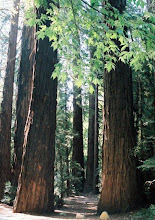Tuesday, February 23, 2010
Making Room To Grow
(Picture - Judean desert)
I was first introduced to compost when my dad retired from the Air Force and we moved back to the family homestead. There was a heap out near the garden and everything from potato peels, dead flowers, to coffee grounds went out on the compost heap. It was often one of my jobs to carry stuff out there. It was one of the things I didn't understand and didn't like about moving back on the farmstead.
I felt like I had been torn away from my best friend, the things I loved doing, and civilization where everything was a short bike-ride away. Here I was stuck out in the country on a gravel road and going into town meant waiting for a ride and going where my parents were going. At the age of 16, I milked it for all the drama it was worth I'm sure. That smelly, ugly compost heap was just a small part of the things I didn't understand and hated. I felt like I was going to die.
As that first year went on, the empty spaces left by the things and people I had left behind began to be filled with new things. I began to be changed by the space around me. City lights became replaced by the enchantment of a full moon on new snow which lit the night bright enough for skiing or walking. The summer nights were filled with the sound of croaking frogs and buzzing crickets and the miracle of northern lights. And as time went on, I saw the compost heap turn earthy smelling and become part of the garden; there were strawberries, new peas, carrots, potatoes, and beans. I rediscovered the four seasons, the Milky Way, silence, and myself.
The first three gospels tell us that immediately (their word) after his baptism, Jesus was driven out into the wilderness. (Luke 4:1-4) He was there for 40 days which is traditional bible-speak for a long but necessary time. Things often happen for 40 days or 40 years in the Bible. The Israelites wandered for 40 years in the desert during which time they were taught to trust in God came together as God's people.
There are strong ties between both of these desert stories with some major differences. The Israelites are forever trying Moses' (and God's) patience because they keep turning their back on God and forgetting or refusing to live as God's people. Where they and we always fail, Jesus remains faithful. Jesus fulfills and completes the story by remaining faithful and without sin.
The forty days of Lent are a time for us to empty our lives of at least some of the excesses so that there is room to fill up our hearts and minds with God. Lent is a time to give up some things so that that space and time is then filled up with the activities and disciplines that bring us closer to God and feed our faith; things like prayer, study, worship, and acts of service to those in need.
We do not need to punish or sacrifice ourselves for Lent, hoping to somehow make ourselves worthy for God. Jesus has done all that is required. Our wilderness time of Lent is a time to become closer to the God who loves us. In coming just as we are to God, in confessing our sin and brokenness, God takes even that and makes new growth, new life. Read Romans 6:1-4
Subscribe to:
Post Comments (Atom)


No comments:
Post a Comment